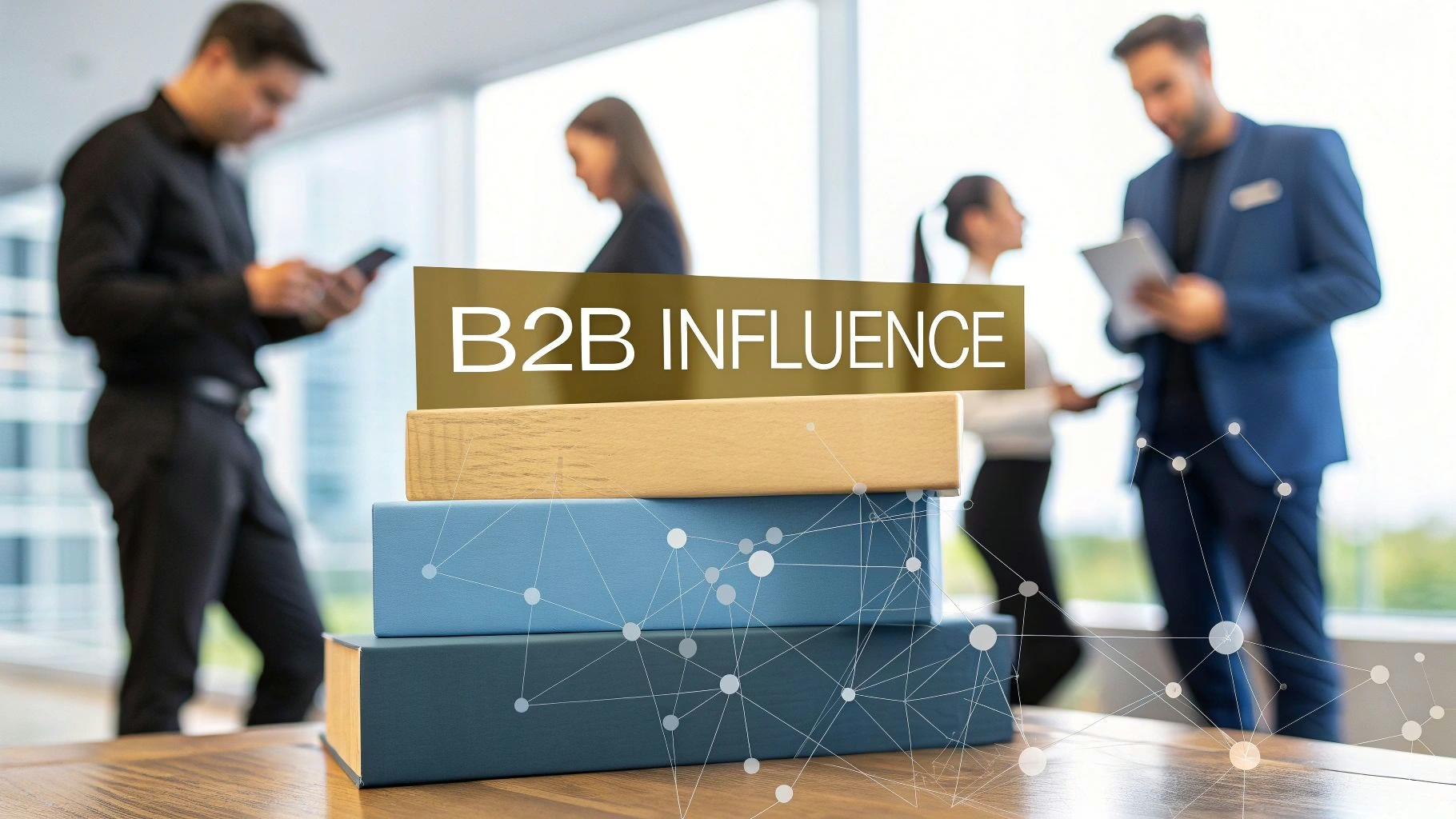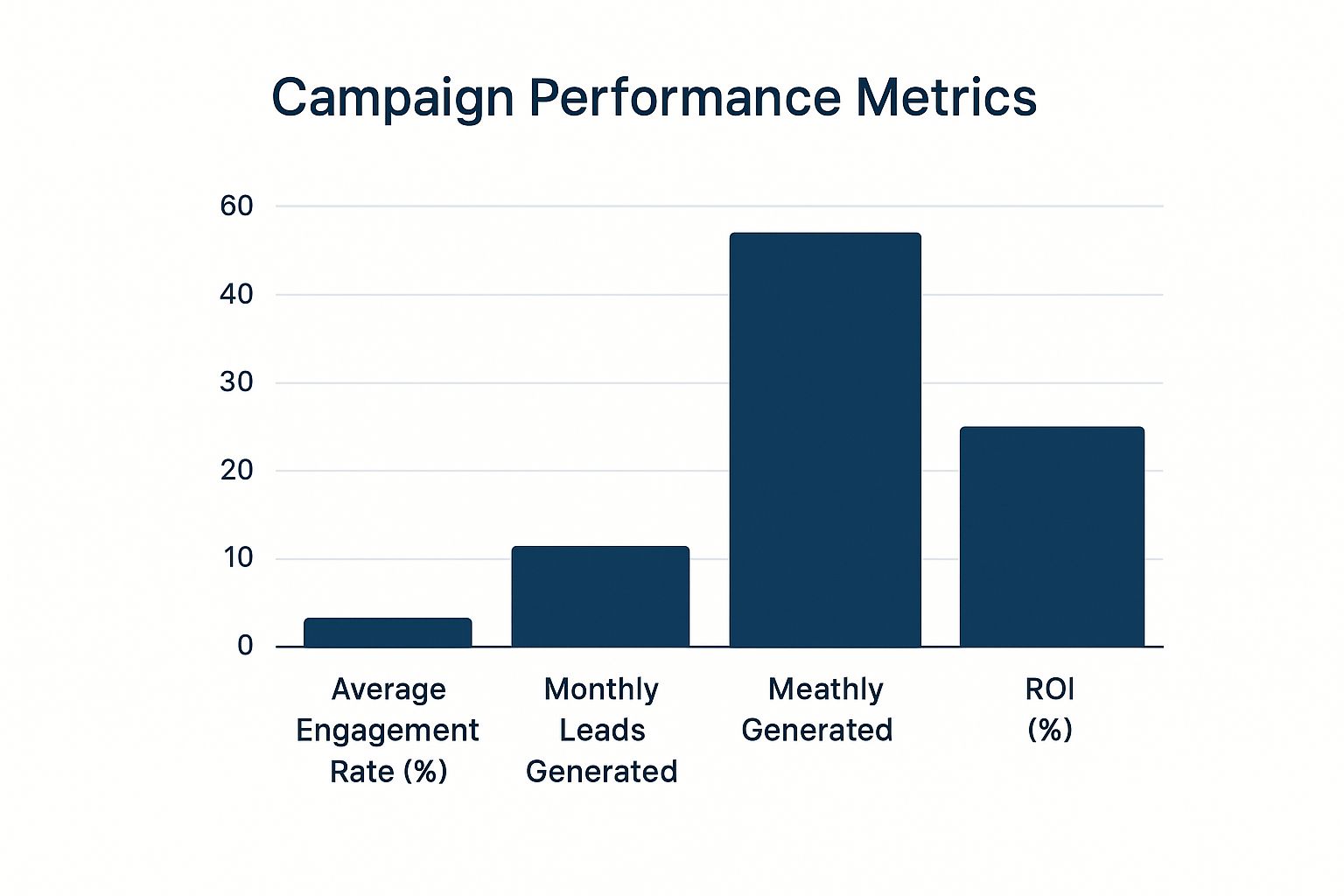Why B2B Influencer Marketing Is Having Its Moment
Influencer marketing is no longer a passing fad; it’s a major force transforming how B2B companies connect with their target audiences. This represents a significant shift away from traditional, often impersonal, B2B marketing strategies. Progressive businesses are now realizing the importance of authentic voices and genuine relationships. They are moving past simple brand messaging and embracing the influence of trusted individuals to champion their products and services.
The Shift Towards Authenticity
Traditional B2B marketing often relies on impersonal tactics that can struggle to connect with decision-makers. Influencer marketing offers a fresh approach. It utilizes the credibility and trust earned by industry experts and thought leaders to connect directly with key decision-makers. This personal and engaging approach fosters genuine conversations, resonating more effectively than traditional advertising. An influencer’s endorsement often carries more weight than a company’s self-promotion, especially when dealing with complex B2B solutions.
Embracing Complexity in the Sales Cycle
B2B sales cycles are often long and complex, involving multiple stakeholders and careful deliberation. This is where B2B influencer marketing truly excels. Influencers nurture leads throughout this process by sharing valuable insights and building trust. They address concerns and offer objective perspectives, ultimately simplifying the path to conversion. Influencers effectively act as trusted advisors, guiding potential clients through the intricacies of the buying process. Since 2023, influencer marketing has gained increasing recognition as a strategic tool in B2B. In 2023, 30% of B2B marketers in the US planned to increase their focus on influencer marketing. This trend continues to rise, with 94% of B2B marketers in 2024 stating that influencer marketing is a successful strategy. This clearly indicates a significant increase in adoption and perceived effectiveness. Find more statistics at: Goat Agency – Influencer Marketing Statistics
The Power of Relationships
The defining characteristic of influencer marketing is its emphasis on building genuine, lasting relationships. B2B companies are shifting away from transactional interactions and investing in ongoing partnerships with influencers who deeply understand their markets. This shared purpose facilitates deeper collaboration, leading to more impactful content and stronger audience engagement. This approach recognizes that trust and credibility are built over time and that long-term relationships are crucial for sustained success in B2B. As a result, many companies are dedicating larger portions of their marketing budgets to relationship-focused influencer programs, allowing them to harness the power of authentic advocacy and cultivate a sustainable competitive advantage.
Building Partnerships, Not Just Campaigns
In the B2B world, the days of short-term influencer collaborations are numbered. Smart companies are now focusing on developing lasting partnerships with influential people. These aren’t just popular social media figures; they are respected professionals within your industry who have a deep understanding of your target audience.
This change represents a shift away from transactional influencer marketing campaigns and towards building genuine, long-term business relationships.
Why Long-Term Relationships Matter
This move towards relationship-focused influencer marketing comes from the understanding that trust and credibility aren’t built overnight. Ongoing partnerships allow influencers to become thoroughly familiar with your brand, its values, and its products or services.
This deeper knowledge leads to more authentic and effective content that truly connects with B2B decision-makers. For example, a long-term partner can offer consistent, valuable insights about your product over an extended period, integrating it seamlessly into their content instead of just creating a single sponsored post.
Moving Beyond Follower Counts
Choosing the right influencers in B2B requires looking beyond superficial metrics like follower count. While reach is still important, real influence comes from a person’s authority, expertise, and the respect they have within their professional circle.
This means assessing potential partners based on the quality of their content, their industry recognition, and how their audience engages with them. It’s similar to choosing a business partner – you wouldn’t just consider the size of their office; you’d also look at their experience, reputation, and the value they bring to the partnership. You might be interested in: Our sitemap for more posts
The Value of an “Always-On” Approach
B2B influencer marketing priorities have evolved to emphasize building long-term relationships and using an “always-on” approach. This involves continuous interaction with influencers, not just occasional campaigns.
In fact, 58% of B2B marketing teams now use an always-on strategy. These teams report a 99% effectiveness rate for their influencer programs, significantly outperforming teams without a similar strategy. This consistent presence builds stronger audience connections and keeps your brand at the forefront of their minds. Find more detailed statistics here: SproutSocial – Influencer Marketing Statistics
Beyond Financial Compensation
While fair payment is crucial, truly effective partnerships go beyond money. Consider providing influencers with co-creation opportunities, invitations to exclusive events, or early access to new products and services.
These non-financial incentives can create a stronger sense of shared goals and deepen the relationship. This collaborative approach recognizes that successful partnerships are built on mutual benefit and shared success. By investing in these stronger relationships, B2B companies can unlock the full potential of influencer marketing, achieving results that one-off campaigns simply can’t match.
Measuring What Actually Matters in B2B Influence
Effective B2B influencer marketing requires moving past surface-level metrics like follower counts and likes. Instead, the focus should be on metrics that demonstrate tangible business results. This means understanding how influence translates into outcomes throughout the B2B sales cycle, which can often be extensive.
Beyond Vanity Metrics: Measuring Real Impact
Successful B2B influencer marketing programs prioritize metrics with real impact. These could include website traffic generated from influencer content, leads captured through collaborative webinars, or even closed deals influenced by an ongoing partnership. Using data this way provides a clear view of how influencer activities contribute to overall business objectives. This shift towards measurable results is crucial for showcasing the ROI of influencer marketing to company leadership.
Setting Realistic Expectations and Identifying Key Signals
Program maturity plays a significant role in setting realistic performance expectations. A new program will likely concentrate on building brand awareness and making initial connections. Early success in this stage might be measured by the number of relevant industry conversations sparked by influencer content. As a program matures, the focus shifts to its effect on lead generation and sales pipeline growth. This means KPIs will evolve from awareness-based metrics to revenue-focused outcomes. Identifying these key signals helps optimize the program and demonstrate consistent progress.
Navigating Measurement Challenges and Innovative Approaches
Many B2B teams struggle to connect influencer activity to revenue, often due to the complex nature of long B2B buying cycles. Advanced attribution models, like weighted attribution, can help. These models consider all touchpoints in the customer journey, including influencer interactions, to accurately assess the impact of each channel. This helps track how influencer marketing affects the sales pipeline within complex B2B environments. Recent data reveals impressive results for B2B influencer marketing compared to other digital marketing strategies. Influencer relations activities deliver 11 times the ROI of other B2B digital marketing activities. Moreover, 54% of brands have reported increased leads and revenue through their influencer marketing efforts. For more detailed insights, see Wildfire PR – B2B Influencer Marketing Stats.
Visualizing Data and Identifying Trends
To better understand the impact of B2B influencer marketing, let’s review the data presented in the comparison table below. This table shows the difference in ROI and other key indicators between traditional B2B marketing channels and influencer marketing programs.
B2B Influencer Marketing ROI Comparison
| Marketing Channel | Average ROI | Lead Generation Impact | Time to Results | Long-term Value |
|---|---|---|---|---|
| Traditional B2B Marketing (e.g., Paid Ads, Email) | 2-5x | Moderate | Short-term | Moderate |
| Influencer Marketing | 11x | High | Medium-term | High |
This table highlights the significantly higher ROI from influencer marketing (11x) compared to traditional B2B marketing (2-5x). It also underscores the stronger impact influencer marketing has on lead generation and its potential for high long-term value. This is because influencer marketing fosters trust and credibility, leading to deeper customer relationships.
Finding the Right Voices for Your Business
Identifying the right influencers for B2B influencer marketing requires a strategic approach. Unlike B2C, it’s less about broad reach and more about connecting with key decision-makers within specific industries. This section explores how successful B2B companies identify and evaluate potential influencer partners.
Looking Beyond Surface Metrics
Effective B2B influencer selection prioritizes quality over quantity. While follower counts offer a glimpse of potential reach, they don’t tell the whole story. Instead, focus on true industry authority, audience relevance, and content quality. An influencer with a smaller, highly engaged audience of industry specialists can often deliver more value than one with a larger, more general following. This targeted approach ensures your message resonates with the right people.
Conducting Thorough Influencer Research
Finding impactful voices requires in-depth research. This goes beyond simply browsing social media profiles. It involves carefully analyzing an influencer’s past content, evaluating their engagement levels (likes, comments, shares), and understanding their audience demographics. Dive deep into their expertise and assess how it aligns with your brand’s goals. For further guidance, explore our comprehensive guide on finding influencers.
Evaluating Content Consistency and Depth
Consistent, high-quality content is a hallmark of a valuable influencer. Look for individuals who regularly create content that provides genuine value to their audience. Equally important is the depth of their industry knowledge. Do they offer superficial insights, or do they demonstrate a deep understanding of complex topics? A thorough assessment of content consistency and depth will help ensure the influencer can effectively communicate your brand’s message with authority and credibility.
Gauging Professional Credibility
In the B2B landscape, professional credibility is paramount. Evaluate an influencer’s reputation within your specific industry. Consider their professional affiliations, speaking engagements, publications, and industry recognition. A strong reputation ensures the influencer’s endorsement carries weight and resonates with decision-makers.
Establishing Initial Connections
Once you’ve identified potential influencer partners, building genuine connections is key. Engage with their content, participate in their webinars, or reach out directly with a personalized message. These initial interactions form the foundation for a mutually beneficial partnership.
Aligning With Brand Values and Messaging
Finally, ensure the influencer’s values align with your brand’s messaging and overall identity. This alignment strengthens the authenticity of the partnership and enhances the credibility of your message. This strategic approach prioritizes building long-term relationships that drive meaningful business results – a cornerstone of successful B2B influencer marketing.
Creating Content That Resonates With Decision-Makers
Effective B2B influencer marketing relies heavily on content that truly connects with decision-makers. This requires going beyond standard marketing brochures and developing targeted content that directly addresses the specific needs and interests of business professionals. Let’s explore how to create this type of content through collaboration with industry influencers.
Understanding Your Audience
The foundation of resonant content lies in understanding your target audience. Begin by identifying their pain points. What challenges do they face daily? What information are they actively searching for? What motivates their decisions? Answering these questions will shape a content strategy that delivers genuine value. This research process mirrors a successful salesperson’s approach – understanding the client’s needs and priorities is paramount for a compelling presentation.
Co-Creating Valuable Content With Influencers
Collaborating with influencers provides access to their unique expertise and perspective. Involve them in the content creation process from the initial stages. This collaborative approach ensures the final product is authentic and beneficial for both your audience and the influencer’s followers. Consider co-creating a white paper or webinar on a relevant business topic, leveraging the influencer’s specific knowledge to boost credibility and expand reach.
Content Formats That Drive Engagement
Different content formats serve different purposes in B2B influencer marketing. In-depth thought leadership pieces, such as blog posts or articles, position your brand as a trusted source of information. Technical deep-dives, including white papers and case studies, showcase your expertise and draw a specialized audience. Interactive webinars and executive roundtables provide engaging platforms for discussion and knowledge exchange. Choose the format that best aligns with your specific goals.
Effective Influencer Briefing and Content Governance
A comprehensive briefing document is essential for guiding influencers and ensuring consistent messaging. Clearly outline your objectives, target audience, and key takeaways. Incorporate any industry regulations or compliance requirements. This clarity streamlines the creation process and minimizes miscommunication. Content governance is especially critical in regulated industries like finance and healthcare. This involves a thorough review process to ensure all content adheres to legal and ethical standards.
Scaling Production While Maintaining Quality
As your B2B influencer marketing program grows, preserving content quality becomes paramount. Implementing efficient production processes and utilizing project management tools is crucial. This ensures consistent quality while optimizing workflow. This approach can be likened to a content assembly line – each stage needs to function smoothly for optimal efficiency and high quality. B2B influencer marketing hinges on trust and credibility. Therefore, creating impactful content is essential. By collaborating closely with influencers and implementing a solid content strategy, you can effectively engage decision-makers and drive measurable results.
Leveraging Trust Networks in Professional Decisions
Business decisions, particularly those involving substantial investments, are rarely made in isolation. Trust is paramount, often eclipsing the influence of polished marketing campaigns. This is precisely where B2B influencer marketing becomes incredibly valuable. It delves into the psychology of professional decision-making by utilizing pre-existing trust networks.
The Power of Peer Validation
Consider this: would you be more inclined to trust the claims of a salesperson or the recommendation of a respected colleague who has successfully implemented a product? In the B2B landscape, peer validation frequently serves as the decisive factor. Influencers, due to their established credibility, function as trusted advisors within their professional spheres. They bridge the gap between your brand’s messaging and the inherent skepticism often associated with B2B purchases. Their endorsements resonate as authentic recommendations rather than paid advertisements.
Activating Authentic Conversations
B2B influencer marketing is not simply about broadcasting messages; it’s about fostering genuine conversations within relevant professional circles. For instance, an influencer discussing your software solution on a prominent industry forum can spark a series of comments and questions from potential clients. This organic engagement cultivates trust and provides valuable social proof. Moreover, influencers can amplify positive word-of-mouth regarding your brand through their established networks. Learn more in our guide on site categories.
Creating Cascade Effects
The influence of B2B influencer marketing extends beyond an influencer’s immediate followers. When a respected figure endorses your brand, it initiates a cascade effect. The endorsement permeates their network, and subsequently, their connections share it within their own circles. This ripple effect significantly broadens your brand’s reach and reinforces the message of trust. The efficacy of B2B influencer marketing is evident in its impact on purchase decisions. 91% of B2B purchases are influenced by word-of-mouth, underscoring the importance of social validation in business. As of 2024, increasing brand awareness and building credibility remain major priorities, with 67% and 54% of brands, respectively, focusing on these objectives. For more insights, explore SproutSocial – Influencer Marketing Statistics.
Building Credibility Through Genuine Dialogue
Effective B2B influencer marketing initiatives prioritize genuine dialogue. This entails providing opportunities for influencers to engage with your brand and solutions on a deeper level. This could involve inviting them to participate in product development discussions, granting them early access to new features, or including them in customer feedback sessions. These experiences empower influencers to speak about your brand with authentic authority, reinforcing their credibility and the trust they foster within their audience. This genuine engagement is crucial for expediting the often-complex B2B buying process, transforming prospective customers into brand advocates.
What’s Next for B2B Influencer Marketing
B2B influencer marketing is a dynamic field. Staying ahead requires understanding emerging trends and anticipating the future of B2B influence. This goes beyond simply replicating current best practices. It involves looking ahead and adapting to the changing dynamics of the digital sphere.
The Rise of AI in Influencer Marketing
Artificial intelligence (AI) is changing how we identify and analyze influencer performance. AI-powered tools like BuzzSumo can analyze vast amounts of data to pinpoint potential influencers with greater precision. This goes beyond follower counts, considering engagement, content relevance, and brand alignment. AI can also analyze campaign performance in real-time, providing valuable insights into what resonates with audiences. This data-driven approach optimizes campaigns and improves ROI.
Employee Advocacy as a Complementary Strategy
Employee advocacy programs are gaining traction alongside external influencer initiatives. Employees offer insider knowledge and can act as authentic brand ambassadors. This organic advocacy amplifies your message within professional networks, building trust and credibility. Encouraging employees to share company content and engage in industry discussions strengthens your brand’s voice.
The Growing Importance of Micro-Communities
Micro-communities, niche groups within larger platforms, are becoming important for B2B influence. These communities provide a targeted way to engage with key decision-makers. Influencers within these communities can spark meaningful conversations and drive authentic engagement around specific offerings. This focused approach allows brands to connect with the right audience in a more intimate setting.
Navigating Privacy Regulations and Platform Dynamics
As privacy regulations change and social media platforms evolve, businesses must adapt. This includes prioritizing data privacy and building resilience against algorithm shifts. Transparency and ethical data practices are key for building trust with audiences. Staying informed about platform policy changes and adapting influencer strategies accordingly is essential.
To help you strategize effectively, we’ve created a matrix outlining key priorities for your B2B influencer marketing program. This matrix considers different business objectives and levels of program maturity to guide your approach.
B2B Influencer Marketing Priority Matrix
| Business Objective | Key Influencer Type | Recommended Content Approach | Measurement Focus | Success Timeline |
|---|---|---|---|---|
| Brand Awareness | Industry Thought Leaders | Thought Leadership Articles, Webinars | Reach, Impressions, Engagement | Medium-Term |
| Lead Generation | Niche Experts, Micro-Influencers | Case Studies, Product Demos, Tutorials | Leads Captured, Conversion Rates | Short to Medium-Term |
| Sales Pipeline Growth | Customer Advocates, Brand Ambassadors | Testimonials, Success Stories, Reviews | Sales Conversions, Revenue Growth | Long-Term |
This matrix provides a starting point for tailoring your influencer marketing strategy. By aligning your objectives, influencer selection, content approach, and measurement focus, you can maximize the impact of your efforts. Remember, a well-defined strategy is essential for achieving your desired outcomes. For connecting with the right influencers, consider exploring platforms like REACH Influencers. This platform connects brands with various content creators, enabling tailored campaigns that resonate with target audiences.






